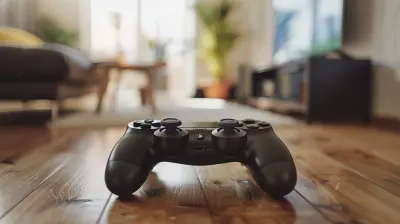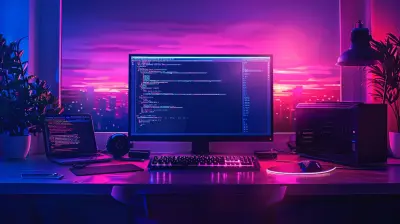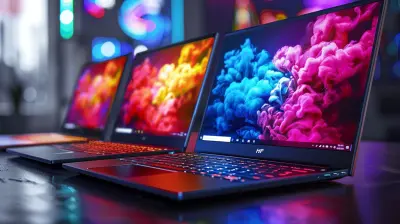Google Pixel vs. iPhone: Which Camera is Truly Better?
13 June 2025
Smartphone cameras have become so good, they’re practically replacing DSLRs for most people. And when it comes to this space, two names dominate the conversation: Google Pixel and Apple iPhone. Search online or ask any tech enthusiast, and you'll find a split crowd—each side passionately defending their favorite.
So, let’s finally settle this. When it comes to the Google Pixel vs. iPhone, which camera is truly better?
We’re breaking this down in a head-to-head comparison, focusing on real-world photography, hardware muscle, software brains, and everything in between.
![]()
The Camera Showdown: Pixel vs. iPhone
Both phones have their own flair. Google's Pixel is known for its AI-driven photo wizardry, while the iPhone flexes powerful image processing and a more consistent shooter across all lighting conditions. But how do these translate into actual shots?Let’s compare key camera elements and let the pixels do the talking.
![]()
📸 Image Quality: First Impressions Matter
iPhone: Natural and Balanced
iPhones have always delivered images that are true to life. They lean on accurate skin tones, minimal color saturation, and excellent white balance. If you're snapping pics of your dog at the beach or your friends at brunch, the iPhone gives you something very close to what your eyes see.With the iPhone 14 Pro and iPhone 15 Pro, Apple introduced a 48MP sensor, giving more detail and flexibility. And the Smart HDR 4 system balances exposure beautifully across faces and backgrounds—even in tough lighting.
Pixel: Punchy and AI-Powered
Now, the Pixel’s approach is more... creative. Google's computational photography is legendary. You tap the shutter, and the Pixel instantly applies a cocktail of enhancements on the fly. It sharpens details, enhances contrast, corrects exposure, and often adds that extra "pop" to your shots.The Pixel 7 Pro and Pixel 8 Pro excel at turning ordinary photos into eye candy. Sometimes the colors are slightly exaggerated, but in a good way. It’s like switching from regular TV to 4K HDR—everything feels more vibrant.
Verdict: Pixel for Drama, iPhone for Reality
If you want photos that are dramatic, vibrant, and ready to post without edits, the Pixel is your friend. But for a more natural, true-to-life image, especially for portraits, the iPhone gets the win.![]()
🌙 Night Mode: Shooting in the Dark
Pixel: AI to the Rescue
Night Sight on the Pixel is a game-changer. It can practically see in the dark. Google’s advanced image stacking uses multiple frames and AI smarts to brighten scenes without blowing out highlights.Even in near-pitch-black settings, the Pixel dominates by pulling out shadows and details you didn’t even know were there.
iPhone: Smooth and Thoughtful
Night Mode on the iPhone is very capable too, especially on the Pro models. It offers a softer, more natural look, avoiding the over-sharpened or over-brightened result that you sometimes get with the Pixel.The iPhone tends to expose just enough light to make it look like the photo was taken in low-light—not artificially daylight.
Verdict: Pixel for Brightness, iPhone for Realism
Pixel gives you almost magical night photos, but sometimes at the cost of looking too artificial. iPhone’s night shots strike a good balance—bright, yet believable.![]()
😍 Portrait Mode: Bokeh that Blurs Just Right
iPhone: DSLR-Like Depth
Apple’s Portrait Mode has improved significantly in recent years. It captures foreground and background separation beautifully, making it look like you used a real camera with a wide aperture lens.It handles hair edges, glasses, and tricky lighting better than ever, and the bokeh feels smooth and natural.
Pixel: Bold and Precise
Google’s portraits are sharper and more dramatic. They add more contrast and often intensify facial features. This is awesome for adding mood or style to a shot but can sometimes make you look more intense than you actually feel.The Pixel also tends to blur backgrounds more aggressively, which might be too much for some eyes—but it’s definitely eye-catching.
Verdict: iPhone for Natural, Pixel for Artistic
If you’re after a gentle, flattering portrait, go iPhone. If you want your pic to pop and stand out, Pixel delivers.🔍 Zoom Capabilities: Who’s Got the Better Lens?
iPhone: Clean at Every Step
The iPhone Pro models come with telephoto lenses (up to 5x on the latest versions). The image quality stays consistent across all zoom levels thanks to Apple’s processing.But once you cross the digital zoom territory past 5x or 10x, detail starts to fade, and noise creeps in.
Pixel: Sharper at High Zoom
Google’s Super Res Zoom technology, especially on the Pixel Pro models, is no joke. You can go up to 30x and still get usable shots. It blends multiple images and uses AI to reconstruct more detail than you thought possible from a phone sensor.For spying on a bird across the park or getting clearer shots of faraway objects, the Pixel wins.
Verdict: Pixel Dominates Zoom
Pixel takes this one. Even with similar hardware, its software overtakes the iPhone in longer-range shots.
🧠 Software and AI Features
Pixel: The King of AI
Google has done something wild with Pixel software. Features like Magic Eraser, Photo Unblur, and Motion Mode make editing ridiculously easy. You can erase photobombers with a tap or unblur a shaky face—yep, even after the photo is taken.Their Real Tone tech also better represents all skin tones, making shots more inclusive and realistic.
iPhone: Solid but Conservative
Apple's editing tools are strong, but more subtle. You get features like Deep Fusion for texture and Smart HDR for range, but you won’t see the flashier AI tricks that Google offers. Apple prefers to keep things manual and controlled.Verdict: Pixel Takes the AI Crown
From shooting to editing and everything in between, Pixel’s software is smarter, bolder, and more experimental. iPhone plays it safer but more consistent.🎥 Video: Rolling with the Pros
iPhone: Still the Gold Standard
If we’re talking video, the iPhone is the camera to beat. You get 4K at 60fps on every lens, cinematic mode with depth control, and buttery stabilization even when running or moving fast.Colors, exposure, and focus transitions are all smooth and polished. This is why content creators and vloggers tend to stick with iPhones.
Pixel: Improving, But Not There Yet
Pixel’s video has gotten much better. It now offers 4K recording, improved stabilization, and even cinematic blur. But it still lags behind in dynamic range and low-light video quality.There’s also a slight delay in focusing and some minor jitters when moving quickly. It’s not a deal-breaker, but Apple is still ahead here.
Verdict: iPhone for Video Every Time
This one’s clear cut. The iPhone is unmatched in video—not just better than Pixel, but better than almost every smartphone out there.
🧪 Camera App and User Experience
iPhone: Simple and Consistent
Open the app, point your camera, and shoot. The iPhone’s camera app is snappy, intuitive, and always reliable. It doesn’t overwhelm you with settings or modes. It just works.Pixel: Feature-Packed and Experimental
There’s a lot to love here—Motion Photos, Night Sight, Long Exposure, Astrophotography, Photo Unblur. The app gives you tools to do more, but sometimes it feels like you need to know what you’re doing to get the most out of it.That said, the latest Pixel updates have improved performance and layout, making it more user-friendly.
Verdict: iPhone for Ease, Pixel for Creativity
If you want a set-it-and-forget-it experience, iPhone is spot on. But if you like playing with different modes and experimenting, the Pixel lets you spread your creative wings.⚖️ Final Verdict: So, Which Camera is Truly Better?
Well, it depends on what you value more.Here's the deal:
- Go with the iPhone if you're a video person, want consistent and natural photos, and don’t want to mess around with post-editing too much. It’s the safe, reliable choice with professional-level video chops.
- Pick the Pixel if you want bold, vibrant photos, next-level AI tools, and more editing freedom. It’s the creative option that rewards you for exploring what your shot could be—not just what it is.
In short, iPhone is the professional studio, while Pixel is the creative workshop.
If your feed is filled with videos, vlogs, or you just want something that works effortlessly every time, the iPhone is hard to beat. But if your inner artist wants more control, more flair, and AI magic at your fingertips, the Pixel might just be your secret weapon.
Whatever you choose, one thing is clear: both cameras are phenomenal. We're in the golden age of smartphone photography, and we’re all winners with either in our pocket.
all images in this post were generated using AI tools
Category:
Gadget ComparisonsAuthor:

Pierre McCord
Discussion
rate this article
3 comments
Arwenia Morales
Let’s be real: the iPhone's camera is a powerhouse, but the Google Pixel pushes boundaries with its computational photography. It’s not just about megapixels; it’s about how those pixels deliver in real-world scenarios. Ultimately, pick what suits your style—both are champions in their own right.
June 21, 2025 at 2:20 AM

Pierre McCord
Absolutely! Both the iPhone and Google Pixel excel in their own ways, offering unique strengths in photography. It ultimately comes down to personal preference and photography style.
Henrietta Walker
This comparison highlights the distinct philosophies behind Google's computational photography and Apple's hardware optimization. While Pixel excels in low-light scenarios and AI enhancements, iPhone offers superior color accuracy and video performance. Ultimately, the "better" camera depends on user preferences and specific use cases.
June 19, 2025 at 3:09 AM

Pierre McCord
Thank you for your insightful comment! You’ve captured the essence of the comparison perfectly—both cameras excel in different areas, and the best choice ultimately depends on individual needs and preferences.
Gabrielle McGarvey
Both cameras excel in different scenarios; personal preference matters.
June 14, 2025 at 2:23 AM

Pierre McCord
Absolutely! Each camera has its strengths, and personal preference plays a vital role in choosing the best one for your needs.



